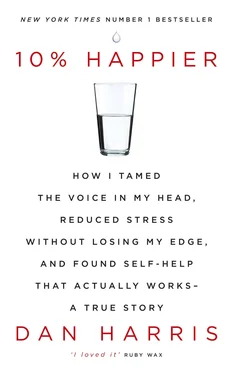“There’s been some talk about the ratings on the show being low. Has that upset you?”
Still holding it together: “No.”
Then came the doozy: “Do you ever worry about your moment having passed?”
She paused, looked over at her publicist, and then issued a delicate snort—a sharp out-breath accompanied by a slight curling of the upper lip. Then she got up and simply walked away. The camera lingered on me, repositioning myself in my chair, my face colonized by an involuntary smirk.
In television news, the storm-off is a coveted thing. This, however, was an unusual specimen. Hilton hadn’t ripped off her mic while shrieking obscenities; she’d just kind of wandered over to the safety of her publicist. Still, I knew, for better or worse, I had captured a memorable moment.
Hilton and her team knew it, too. What followed was a long, strange, and often tense negotiation. We shut off the cameras, as the celebutante, her publicist, and her manager laid into us. At one point, Hilton turned to me and said, “You’re treating me like I’m Tara Reid.”
Her manager tried to surreptitiously strong-arm the cameraman into handing over the tapes, but he refused. Paris herself outright demanded that we not use the material. She didn’t seem to understand that I didn’t work for her, that I was a reporter, not a staffer on her reality show. I stood my ground, although I was at times slightly overwhelmed by the sheer absurdity of the fact that I was having a fight with a household name.
In fact, the decision about whether to use the material was not in my hands. It was up to my bosses. As I boarded a red-eye back to New York, where I’d be live on the GMA set first thing in the morning, the producers asked me to write two versions of the story, which I referred to as “The Safe Version” and “The Nuclear Option.”
When I landed and checked my BlackBerry, I learned we were indeed going nuclear. Right at the top of the show, in the Open, they ran the video of Hilton walking away—and then they “teased” it going into every commercial break, right up until it was time for my story to run. After it aired, the producers and anchors expressed enthusiasm. I left the studio feeling reasonably good.
I went home to crash for a few hours. When I woke up, the story had gone viral. Every entertainment outlet on earth had picked it up. I clicked on The View and saw Joy Behar calling me “rude.” My heart sank.
While ridiculous on a thousand levels, this incident did raise some serious questions about my compassion policy. Had I just committed an egregious violation? After all, I knew there was a possibility my preplanned question would provoke Hilton to walk off. I was even kind of hoping that it would happen. But was I, in fact, rude to her? I tried to reassure myself with the notion that she was, after all, a public figure, and that the chatter about whether her time had passed was all over the blogs. All I did was ask her about an issue that was already in the media bloodstream. I didn’t manage to entirely convince myself.
There was a larger issue at play here: Was journalism—or any high-stakes, competitive profession, really—incompatible with metta? My job required me to ask provocative questions, to “go in for the kill,” as we say—and, often, that wasn’t so nice.
This question of incompatibility was about to come blazing to the fore. After all my nattering on about how Buddhism didn’t make you lose your edge, how meditation was a superpower, and blah blah, I would be hoisted on my own petard.
When the email arrived, I was marinating in sitar music in the ornate, honey-lit lobby of the Intercontinental Hotel in New Delhi. It was late 2010, and I was in India to shoot an investigative story about unscrupulous back-alley doctors.
Back at the home office, an earthquake had hit. After months of fevered speculation about who would take over for David Westin, we finally received the official announcement from the head of the ABC Television Group. The name of my new boss was: Ben Sherwood.
He and I had a history. It was Ben who was in the control room as the executive producer of GMA when I had my first panic attack. Ben had been very supportive in that moment, immediately getting in my ear and making sure I was okay. As I stared at my BlackBerry, I began calculating what this announcement meant for me. Ben and I had always had a good relationship, I told myself. Although, with a twinge of embarrassment, I also quickly flashed back to moments when I’d mouthed off to him, in an era when I was prone to do such things. There was that time when he’d asked me to do a live shot in the aftermath of Hurricane Katrina holding up a handful of sludge from the soaked streets of New Orleans, to give viewers a visceral sense of the scope of the disaster. I was exhausted and ornery after days of round-the-clock coverage, and I got a little lippy. (I ended up holding the sludge.)
Ben was an unusual species in the broadcast news ecosystem, both in terms of pedigree and personality. A Harvard grad and Rhodes scholar, he’d held a variety of senior jobs at both ABC and NBC. Between news gigs, he would head off on his own and write a book. He had three bestsellers under his belt, one nonfiction book and two novels. (One of the novels had even been made into a movie, Charlie St. Cloud , starring teen idol Zac Efron.) He was extremely tall, crackling with energy, and capable of both earnestness and sarcastic candor.
I didn’t know it as I sat in the lobby in India absorbing the news, but Ben’s arrival would precipitate a professional crisis.
He began work a few weeks later. Things started off well enough between us. He was sending encouraging emails. For example, he liked a one-liner of mine during a “live-wrap” I did on weekday GMA. After a story about a young man who was forced to stand for an entire flight from Chicago to Florida because he was too tall to sit in his seat, I said, “Not a problem I’ve ever had.”
Then, when Congresswoman Gabrielle Giffords was nearly killed by a deranged, gun-toting college dropout at a “Meet Your Representative” event, Ben dispatched me to Tucson as part of the first team in. It was a round-the-clock work marathon. I’d covered mass shootings before, but the outpouring for Representative Giffords and the other victims was like none I’d ever seen. After a few days on the ground, Ben called me and we had a detailed, positive discussion about how the news division was covering the story.
It quickly became clear that Ben was going to be the most hands-on boss most of us had ever had. He personally presided over the division-wide conference call every morning, putting on a master class in TV producing, variously engaging in pointed critiques and lavish praise of our work, including details as small as the graphics and the individual shots that producers chose in their stories. The call became appointment listening.
His emails—evocative little tone poems—showed up in our in-boxes at all hours. The man did not appear to sleep. He watched every minute of every show we did, and nothing escaped his attention. One day, I did a story for World News about a new poll showing that mainline Protestant churches were losing membership. Distracted by other work, I hadn’t put a lot of time or effort into the piece—I had basically phoned it in. As soon as the story aired, I got an email from Ben saying the writing seemed flat and unimaginative. He was right and I had no defense. It was both terrifying and invigorating to have a boss who knew your job as well if not better than you did. He had served notice: no one would get away with lazy work.
As I watched the entire news division scramble to reorient to this dynamic new presence, I made a calculation: I wasn’t going to crowd him or go out of my way to impress him. I didn’t put in any extra effort to produce special stories that might catch his eye, and I didn’t angle for face time. My motives were opaque, even to me. Maybe I thought it’d be unseemly. I was now a guy who was hanging out with the Dalai Lama; I shouldn’t be striving so nakedly, right? I figured he knew me, knew my history; I’d be fine. I’d lived through these seismic events before—including Peter’s death and Charlie’s retirement—and always emerged unscathed, if not enhanced. I had seemingly stowed my internal cattle prod in favor of a new, creeping passivity.
Читать дальше












